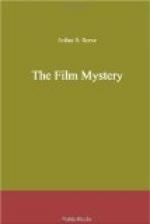“What was the poison, Mr. Kennedy?” Mackay asked, in a low voice.
“I think that it was closely allied to the cyanide groups in its rapacious activity.”
“But you haven’t identified it yet?”
“No. So far I haven’t the slightest idea of its true nature. It seems to have a powerful affinity for important nerve centers of respiration and muscular co-ordination, as well as possessing a tendency to disorganize the blood. I should say that it produces death by respiratory paralysis and convulsions. To my mind it is an exact, though perhaps less active, counterpart of hydrocyanic acid. But that is not what it is or I would have been able to prove it before this.”
Mackay nodded, listening in silence.
“You’ll say nothing of this?” Kennedy added.
“I’ll be silent, of course.”
Heavy footsteps from the rear marked the return of Phelps, who had covered the upper floors, descending by the back stairs so as to have a look at the kitchen.
“Everything seems to be all right,” he remarked, half graciously.
Kennedy led the way to the front porch. There he seemed more interested in the weather than in the case, for he studied the sky intently. Glancing up, I saw that the morning was still gray and cloudy, with no promise that the sun would be able to struggle through the overhanging moisture.
“I don’t think we’ll go back to the city—that is, all the way in,” he remarked, speaking for both of us. “I want to go to the Manton studio first. This is no day for exteriors and so they’ll probably be working there.” He smiled at Phelps. “I want to see if any of our possible suspects look as though they had been engaging in nocturnal journeys.”
Phelps had been rubbing his eyes. He dropped his hand so quickly that I wanted to smile; then to cover his confusion he promptly offered to drive us in. Mackay at the same time volunteered his car.
Kennedy accepted the latter offer. As he thanked the banker I wondered if any suspicion of that individual lurked in the back of his mind. Phelps certainly had made a very bad impression upon me with his antagonistic attitude, with his readiness to transform every question into a personal affront.
“Just one other thing, Mr. Phelps,” exclaimed Kennedy, as we were about to descend to Mackay’s car. “Why did you wish the scenes in ‘The Black Terror’ actually taken in your library?”
Kennedy had asked the question before. Had he forgotten? I glanced at the banker and read the same thought in his expression.
“I—I’m proud of my library and I wanted to see it in pictures,” he replied, after some hesitation and with a little rancor.
“Not to save money?”
“It would be no appreciable saving.”
“I see.” Kennedy was tantalizingly deliberate. “How long have you held the controlling interest in Manton Pictures, Mr. Phelps?”




